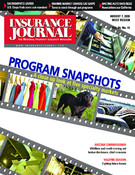Three insurance trade groups filed a lawsuit seeking declaratory and injunctive relief to stop enforcement of California Department of Insurance auto rating regulations they said will harm millions of policyholders.
On behalf of the Association of California Insurance Companies (ACIC), the American Insurance Association (AIA) and the Personal Insurance Federation of California (PIFC), Kent Keller, managing partner with Barger & Wolen LLP, filed the suit asking the Sacramento Superior Court to declare the regulations illegal and to grant a preliminary injunction because the groups believe the class rate regulations will force 60 percent of California drivers to pay more for auto insurance. The three trades represent the majority of insured drivers in California.
The regulations, which were recently approved by the California Office of Administrative Law, would make the three auto rating factors detailed in Proposition 103 — driving safety record, miles driven and driving experience — have more weight than any other factors when setting premium rates.
“We believe the department’s regulations violate the insurance code and would force drivers to pay premiums that don’t reflect their risk of loss,” said Sam Sorich, ACIC president. “CDI’s regulations will significantly reduce where a car is garaged as a rating factor in developing auto insurance rates. As a result, insurers would be forced to charge unfair rates, compelling a majority of drivers — particularly in rural areas — to subsidize premiums paid by other Californians.”
In a similar lawsuit, the California Farm Bureau Federation seeks to stop implementation of the regulations on behalf of its members who drive in rural and suburban neighborhoods. It is believed rural drivers’ rates will increase because they drive further distances than urban drivers.
“There are 58 counties in California. [CDI’s] regulations raise rates in 52 of those counties and lower rates in six of them, which is fundamentally unfair and absolutely contrary to Prop 103,” said Ken Gibson, AIA vice president, western region.
“We are totally perplexed as to why [Garamendi] would want to change a system that has been approved by the courts and two commissioners,” said Jerry Davies, PIFC director of communications. “A rate cannot be discriminatory, it cannot be excessive and it cannot be unfair, and we think that these regulations do all of that, which is why the three trade associations that represent 90 percent of the business have asked the courts once again to look at what is being proposed.”
“Under these regulations, the state will be picking winners and losers and force insurers to charge arbitrary rates,” added Rex Frazier, PIFC president. “The California Court of Appeal ruled in 2000, in a case known as Spanish Speaking vs. Low, that the auto rating regulations used today are legal and comply with the requirements set forth in Proposition 103. These new regulations violate Proposition 103 because they require insurers to charge rates that do not reflect the actual risk of loss.”
“It is a shame that Insurance Commissioner John Garamendi ignored the concerns of millions of Californians. Decades of data prove that insurance costs differ among areas in California,” Gibson said. “Besides being actuarially sound, it is just common sense that a driver traveling 50 miles a day through congested downtown Los Angeles faces a far greater risk of having an accident than another motorist traveling the same distance on rural roads.”
The three groups filed the lawsuit in a bid to keep auto insurance rate regulations as is. The Superior Court has 16 working days to conduct a hearing on the request for injunctive relief. Absent obtaining an injunction, the rules will take effect August 14.
“We are in court now and the issue of these regulation’s legality are before a judge,” Sorich said. “That is a positive development for everyone. Because when you put the rhetoric aside and present the issue to a judge, he or she will make a decision based on the law, the way things should be decided.”
CDI Spokesman Norman Williams said the department believes the new regulations are fair and do not penalize good drivers for where they live, thus realizing the promise of Prop 103.
He said Californians voted for how safely one drives to be more important than where one lives, and cited the Automobile Club of Southern California as an example to follow. “It put into place the new regulations and simultaneously gave a 7 percent discount to all of its customers. The Auto Club proved that this is not an issue of rural versus urban drivers. It’s an issue of fairness and rewarding good drivers for driving safely.”
Auto Club of SoCal agreed to base its rates on safety and driving frequency rather than primarily on where a driver lives starting Dec. 1, which the company estimates will lower rates for its customers.
“There are people in Los Angeles now that have never had an accident, who drive very low mileage, who have never filed a claim and pay more than people with DUIs and accidents in some of the suburban and rural areas surrounding Los Angeles,” Williams added. “That is the kind of discrimination that we are trying to address.”
Sorich responded, “I doubt, although I haven’t seen every rate filing, that is a prevailing characteristic in companies’ filings.”
William noted the department’s new regulations do not eliminate the importance of the ZIP code. “ZIP codes can be the fourth most important factor, but the three mandatory factors should come first,” he said. “The lawsuit will not stop our efforts to bring fairness to auto insurance pricing.”
Topics Lawsuits California Carriers Legislation Auto
Was this article valuable?
Here are more articles you may enjoy.


 Former Ole Miss Standout Player Convicted in $194M Medicare, CHAMPVA Fraud
Former Ole Miss Standout Player Convicted in $194M Medicare, CHAMPVA Fraud  The $3 Trillion AI Data Center Build-Out Becomes All-Consuming for Debt Markets
The $3 Trillion AI Data Center Build-Out Becomes All-Consuming for Debt Markets  Winter Storm Fern to Cause Up to $6.7B in Insured Losses
Winter Storm Fern to Cause Up to $6.7B in Insured Losses  Howden-Driven Talent War Has Cost Brown & Brown $23M in Revenue, CEO Says
Howden-Driven Talent War Has Cost Brown & Brown $23M in Revenue, CEO Says 


